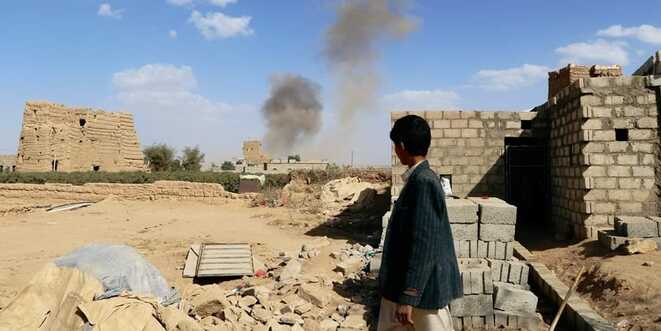
Divine Justice
By a Friend from Yemen
Today we buried my neighbor’s daughter. As we lowered her broken five-year-old body into the ground, I was able to make out on the white burial shroud the contours of her head and her slightly open mouth.
I went down into the hole with her father and brother, and we slid the tiny corpse into its final resting slot. I took a last look at the child who was no more, a casualty of the daily bombardment, then climbed out of the grave and the diggers proceeded to refill the hole.
On the walk back home, I kept thinking of the imam’s words from the Friday sermon, earlier in the day: “She is now with Allah and His angels.”
“Inshallah,” I said to myself, “I hope so.” What gave me pause for reflection, however, was what the imam said next: “Allah never forgets the wrong-doers and His justice will be served on the Final Day.”
“Justice?” I kept thinking all the way to the house and shaking my head. According to my imam, Hitler, Saddam, Idi Amin and all other undeniably bad people get what’s coming to them in the afterlife. Of course, we can’t check on this and there is no evidence for it so we are left to just…”believe it.”
Good and innocent people suffer and die every minute of every day. Many people who have done horrible things live long lives in luxury and comfort and then die peacefully in their sleep. If there is some kind of divine justice at work here on this planet, then it must be very different from the human concept of justice.
Millions of malnourished and parasite-infested children in developing countries do not deserve their fate, at least not by any moral standards I understand, but they keep suffering and dying nonetheless. And the suggestion that good times await these children in heaven after they die is not only impossible to prove, it's also heartless.
If God is all-good and all-powerful, then why does He allow suffering to happen? And why so much suffering? Over the millennia, brilliant theologians, in thousands of volumes, have wrestled with this “problem of evil”, as they call it. None of them - neither Christian, nor Muslim, nor Jew – has been able to come up with a single convincing answer – not one.
The argument from evil is a devastating assault on monotheism. Many people who at one time considered themselves religious turned to atheism not because they were persuaded by logical argument but because the horror of the world’s evil shattered their faith. Elie Wiesel poignantly speaks for them in recalling his experiences in a Nazi death camp, hearing the cries of the children, screaming from the midst of the blazing ovens:
“Never shall I forget those flames which consumed my Faith forever. Never shall I forget that nocturnal silence which deprived me, for all eternity, of the desire to live. Never shall I forget those moments which murdered my God and my soul and turned my dreams to dust. Never shall I forget these things, even if I am condemned to live as long as God Himself. Never”.
The argument from evil haunts monotheists. Qualify his understanding of God as much as he will in order to distance the deity from responsibility for evil, the monotheist no less than the atheist is painfully aware of how short all arguments fall.
The problem of evil is an overwhelming burden for the monotheist. It is his great tragedy.
By now, I was approaching my house, and I caught sight of three children playing in the street. I used to see my neighbor’s daughter play with these children every day.
She will not play with them anymore.
As I was about to open the gate leading to my house, two jets streaked across the sky to my left. The missiles slung under their wings glinted in the afternoon sun, and I knew they were on their way to visit death and destruction on some hapless victims somewhere else.
It dawned on me, at that moment, that there is no warm and cozy blanket of justice covering our planet. The only justice we have is that which we make for ourselves.
I watched the jets recede into the horizon.
“Justice,” I said to myself as I swung the gate open, and stepped in.
The author of this post is Mohamed from Yemen, with an introduction by Connie Wicker from Michigan.